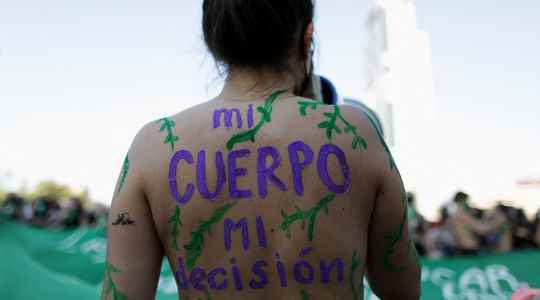In the United States, the recent decision of the Supreme Court on abortion is already proving to have serious consequences for millions of women. A few thousand kilometers to the south, it’s time for hope: Chile could become the first country to enshrine the right to abortion in its Constitution. Responsible for drafting a brand new fundamental law, the constituent assembly formed a year ago submitted its work to President Gabriel Boric on Monday 4 July. The goal: to replace the current Constitution, approved in 1980 under the military regime. With a change of size: article 16 of the project guarantees “to all women and people capable of gestation, the conditions of a pregnancy, a voluntary termination of pregnancy (…) voluntary and protected”. The State, it is written, “also guarantees its exercise without violence or interference from third parties, whether individuals or institutions”. The text will be submitted to referendum on September 4th. On this date, all Chileans will be obliged to go and vote.
A start of victory for feminists, whose mobilization has been accelerating since 2015 throughout Latin America. In Chile, they want to “denounce the conditions in which women have abortions, knowing that there are between 70,000 and 200,000 clandestine abortions per year”, indicates Maricel Rodriguez Blanco, associate researcher at the Center for Research and Documentation on the Americas (creda). Figures confirmed by a study by the Chilean Institute of Reproductive Medicine.
Between 1989 and 2017, Chile was one of the few countries in the world to completely ban the use of abortion. A law inherited from the Pinochet dictatorship, yet completed in 1990, but remained intact for almost 30 years. In 2017, just before the end of the mandate of socialist president Michelle Bachelet, abortion had been partially decriminalized in three cases: rape, risk to the life of the mother and non-viability of the fetus. But only 3,147 legal abortions were recorded between 2018 and 2022, according to Health Ministry data. Held back by this legislation, many women are also held back by their doctors, in the name of the famous “conscientious objection”.
The choice of a social model
“The weight of the Catholic Church is very important, with organizations that have long structured the moral life of the country by carrying out anti-abortion propaganda”, specifies Cécile Faliès, geographer specializing in Chile. In 1990, at the end of General Pinochet’s dictatorship, the country was particularly behind in terms of civil rights. Homosexual relations were not decriminalized until 1999, divorce was authorized in 2004 and same-sex marriage in 2021.
But “all this delay has been caught up quickly”, underlines the geographer, with the vast social movement against inequalities in October 2019 as a catalyst. Chile, long a good student in terms of economic growth, today dreams of occupying a new role in Latin America: that of social leader, as evidenced by the election last December of Gabriel Boric, who at 36 became the youngest president in the country’s history.
Nothing is acquired
But the road leading to the constitutionalization of the right to abortion still looks long. All that remains is to conquer public opinion. A difficult task, as the constituents have been the target of numerous criticisms during their work. While Chilean society suffered the brunt of rising fuel prices and precariousness, they rather gave the impression of being locked in their constitutional bubble in Santiago. “They realized that they had remained in a vacuum,” notes Cécile Faliès. Also, the general discontent was recovered by the right wing in order to discredit the new text.
These same conservatives have also led a disinformation campaign on abortion, as regrets political scientist Fabiola Miranda Pérèz, doctor of political science at the University of Grenoble Alpes and expert in the field of gender in Chile: “They say that women will be able to abort up to nine months, which is not the case at all. This will be a matter of law and can be adapted according to agreements reached in Parliament in the years to come.” If the constitution is validated by the people, it is the parliamentarians who will have the last word in determining the form and content of the law. However, the right remains very present in Parliament, where it has a narrow majority. “To speak now of the liberation of Chilean women is still risky”, sums up the political scientist. Especially since two months before the vote, several polls indicate that the “no” could win.
